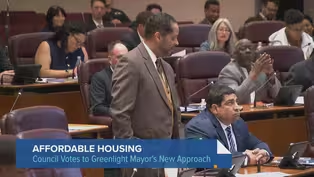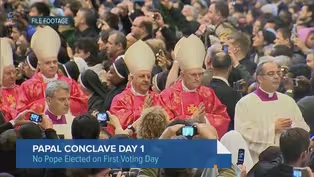Chicago Tonight: Black Voices
Bronzeville Trail Revitalization Project is Underway
Clip: 5/7/2025 | 7m 9sVideo has Closed Captions
Organizers hope to improve the community's health outcomes and opportunities.
The project aims to turn a disused rail line in the historic district into a path for walking, biking and gathering.
Problems playing video? | Closed Captioning Feedback
Problems playing video? | Closed Captioning Feedback
Chicago Tonight: Black Voices is a local public television program presented by WTTW
Chicago Tonight: Black Voices
Bronzeville Trail Revitalization Project is Underway
Clip: 5/7/2025 | 7m 9sVideo has Closed Captions
The project aims to turn a disused rail line in the historic district into a path for walking, biking and gathering.
Problems playing video? | Closed Captioning Feedback
How to Watch Chicago Tonight: Black Voices
Chicago Tonight: Black Voices is available to stream on pbs.org and the free PBS App, available on iPhone, Apple TV, Android TV, Android smartphones, Amazon Fire TV, Amazon Fire Tablet, Roku, Samsung Smart TV, and Vizio.
Providing Support for PBS.org
Learn Moreabout PBS online sponsorshipHistorical trainer out is in line for a new life.
The Bronzeville trail revitalization.
Is project is underway after years of planning, it aims to turn a disused rail line in the historic district into a path for walking biking and gathering the west end of the trail will start near 40th in Dearborn Street, extending eastward 2 miles along 41st Street and ending at Lake Park Avenue.
Organizers hope to honor the area's cultural significance and help improve the community's health outcomes and opportunities.
Joining us with more on the project, our John Adams, executive director and founder of the Bronzeville Trail Task Force and John, leading architect for the project and founder of the architecture firm Jack, thank you both for joining us.
We appreciate know, John Adams, you've been working on this project for about 5 years now.
I know there's a lot that's gone into getting up to this Tell us briefly where things currently stand with the development of the trail.
Sure.
>> October of 2024.
The city Chicago committed 5 million dollars for a pilot activation.
The trail project.
And that was after the city had commissioned a feasibility study which certainly concluded that it's feasible.
And the first commitment, the first spending of that 5 billion was to produce the urban planning document, which is known as a framework plan and the city led a task order in March to a pre qualified bidders and those bids were due by April 15th 2025. and so literally we're anxious and waiting for the city to make a selection, which we think perhaps by the by the end of next week and then we'll know believe consulted the prime for us all to will be on the framework plan.
That's an exciting point in the You know, John, this line used to carry freight and passenger trains.
>> What kind of work are you looking to do in terms of of remediating preserving this embankment?
>> Sure.
So from a remediation standpoint, of course, it has to be cleaned up.
you know there we don't know exactly what the plan will be yet and how deep we need to go to remove soil.
That study still has to take place.
But with respect to what can come watch the cleanup, happened is a review of natural and native plant life that they originally we want to bring that back.
Of course, we want to restore the overpasses.
So the child then becomes connected.
Also, stations that can be reactivated for different uses that become hubs of activity for the neighborhood.
>> And I know you've already begun gathering stories around the trails history.
How do you plan to incorporate them into the project?
Sure.
So for starters, those stories you're going to manifest into a podcast series.
Okay.
And then the archive gets built and built and built and then there will be QR codes along the path that will allow folks to be able to Jack in, if you will, and experience some of the history as their traversing the trail.
And, you know, John Adams, I know this train line has a lot of history, including its proximity to the Roberts Temple Church.
You you know, remind us that the significance behind that, oh, my God.
>> Certainly it was a Johnson publishing.
That made the decision to.
Photos of open casket of Emmett to you.
That happened in 1955. and certainly a lot of archival photos to show all the people who took the time to view his body and certainly movies that have been made about many of them until as well as Roberts Temple is now the National Monument.
And we knew when began the project just because of the proximity of the embankment to Robert's temple in this literally adjacent.
But right up against the parking lot.
The Roberts Temple is going play a significant role.
But I also want to mention just go back to your first question is that the city committed after the freight where plan is completed, that we will go right into this is sort of a technical term phase.
One construction the estimation is the that particular task order we'll have about a 2 million dollar price tag and it gets a little more heavily into engineering and more architectural work.
And so we anticipate that by 2028, the framework plan and phase one construction will be completed and as Mr. referenced, we also looking to get the remediation.
>> Well, and you know, and I know you've got some financial support, several million dollars for the early phases, but it's likely you you may need federal support for this do for see potentially running into roadblocks there.
You know, given the current administration and how are you thinking about trying to overcome that?
So we do think right now it's problematic >> the the funds that the city has committed.
Certainly going to take us right up to November of 2028 when we can hit the yeah.
That's right.
And so at least for now, you know, we're in good hands because all the dollars local.
>> But you certainly, you pointing out the projects like this, this simply don't happen without federal dollars.
And the north side of Chicago.
I mean, one of the poster child of repurposing embankment is a Bloomingdale 606, trail and my numbers could be off a little bit.
But Mayor Emanuel was able to cure about 55 million from the federal government in order to make that trail reality.
Yeah, certainly a key piece of support there.
You know, John, as as this development goes forward, how do you hope to incorporate the community and the things that >> that they want and need?
So absolutely.
It will be an amenity to the community.
And so you can't create an amenity for the community or tourism for the greater community without engaging.
So there will be a lot of community engagement up front to pull the community.
actually, from our perspective, we like making sure we understand the rhythm of our client.
The rhythm of the community and pull it together.
So it all comes together as an architect on from the landscaping to the bridges, to the furniture, to the murals, to the activation of the station's the community will be totally involved and embraced as part of the design process.
For that, I can imagine feels very gratifying to see project come this far and we're looking forward to seeing how it develops, but
City Council OKs Mayor’s New Approach to Building Affordable Housing in Chicago
Video has Closed Captions
Clip: 5/7/2025 | 3m 6s | Chicago faces an affordable housing shortfall of more than 119,000 units. (3m 6s)
What to Know About the Conclave as Voting Begins for the Next Pope
Video has Closed Captions
Clip: 5/7/2025 | 10m 10s | It's the most geographically diverse conclave in the faith’s 2,000-year history. (10m 10s)
Providing Support for PBS.org
Learn Moreabout PBS online sponsorship
- News and Public Affairs

Top journalists deliver compelling original analysis of the hour's headlines.

- News and Public Affairs

FRONTLINE is investigative journalism that questions, explains and changes our world.












Support for PBS provided by:
Chicago Tonight: Black Voices is a local public television program presented by WTTW

